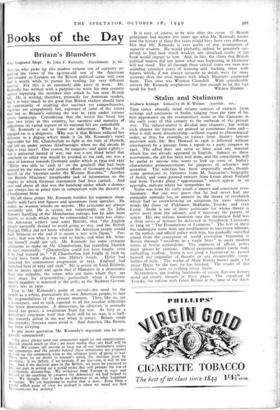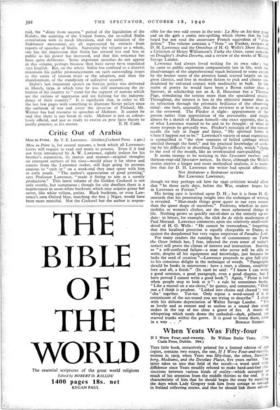Stalin and Stalinism
Stalin's Kampf. Edited by M. R. Werner. (Jarrolds. 16s.) THIS rather absurdly titled volume consists of extracts from writings and utterances of Stalin, ranging from the time of his first appearance on the revolutionary scene in the Caucasus in the early years of this century to the outbreak of the present war. The subject-matter is divided into chapters ; but within each chapter the extracts are printed in continuous form and— what is still more disconcerting—without regard to chronological order, so that, for example, an extract from Stalin's famous interview with Mr. Roy Howard in 1936 is followed without interruption by a passage from a report to a party congress in 1921. The editor does not seem to have used any material which has not already appeared in English. Subject to these reservations, the job has been well done, and the compilation will be useful to anyone who wants to look up some of Stalin's characteristic pronouncements for purposes of reference and quotation. The selection has been impartially made, though some quotations in footnotes from M. Souvarine's biography of Stalin, and some pointed extracts from Lenin about Finland and from Trotsky about " opportunism " which appear in an appendix, indicate where his sympathies lie.
Stalin was from his early youth a sincere and consistent revo- lutionary. But one may guess that he had never had any particular aptitude for, or interest in, the theory of revolution which had so overwhelming an attraction for more abstract minds like those of Plekhanov, Bukharin, Trotsky and even Lenin. Stalin is one of those politicians for whom theory is never more than the adjunct, and if necessary the pretext, of action. His one serious incursion into the theoretical field was a short series of lectures he delivered at Sverdlovsk University in 1924 on " The Foundations of Leninism." The text of these has undergone more than one modification in successive editions, as the author, and official policy with him, has gradually swivelled round from the conception of world revolution beginning in Russia through " socialism in a single State " to more modern forms of Soviet nationalism. The exponent of official policy must always be cautious. Official pronouncements rarely make enthralling reading. Stalin is too good a bureaucrat to permit himself any originality of thought or any recognisable singu- larities of style. The reader of Mein Kampf knows quite a lot about Hitler by the time he has finished. The reader of this volume knows next to nothing about Stalin.
Nevertheless, the leading landmarks of recent Russian history stand out clearly enough in these pages. The expulsion of Trotsky, the tension with Great Britain at the time of the Arcos raid, the " dizzy from success " period of the liquidation of the Kulaks, the courting of the United States, the so-called Stalin constitution with its mock liberalism, and the initiation of the Stakhanov movement, are all represented by extracts from reports of speeches of Stalin. Surveying the volume as a whole, one has the impression that Stalin has uttered less and less in public as his power has increased, and that this reticence has been quite deliberate. Some important speeches do not appear in this volume, perhaps because they have never been translated into English. But, on the whole, Stalin has confined to a discreet minimum his public pronouncements on such outstanding issues as the series of treason trials or the adoption, and then the abandonment, of the standpoint of collective security.
Stalin's last important speech on foreign policy was delivered in March, 1939, at which time he was still announcing the in- tention of his country to " stand for the support of nations which are the victims of aggression and are fighting for the indepen- dence of their country." It is significant that, in order to fill the last few pages with something to illustrate Soviet policy since the outbreak of war and cover the invasion of Finland, Mr. Werner has had recourse to speeches of Molotov. It cannot be said that there is any break in style. Molotov is just as colour- lessly official, and just as ready to evolve ex post facto theory to































 Previous page
Previous page